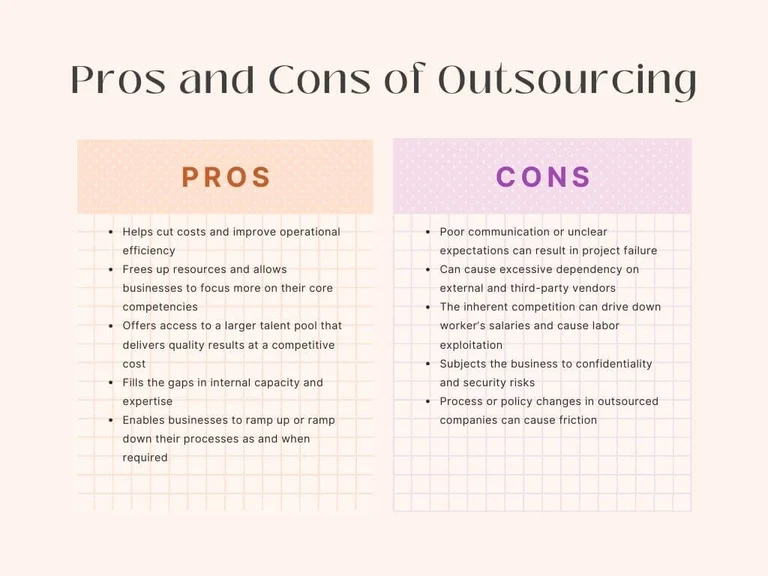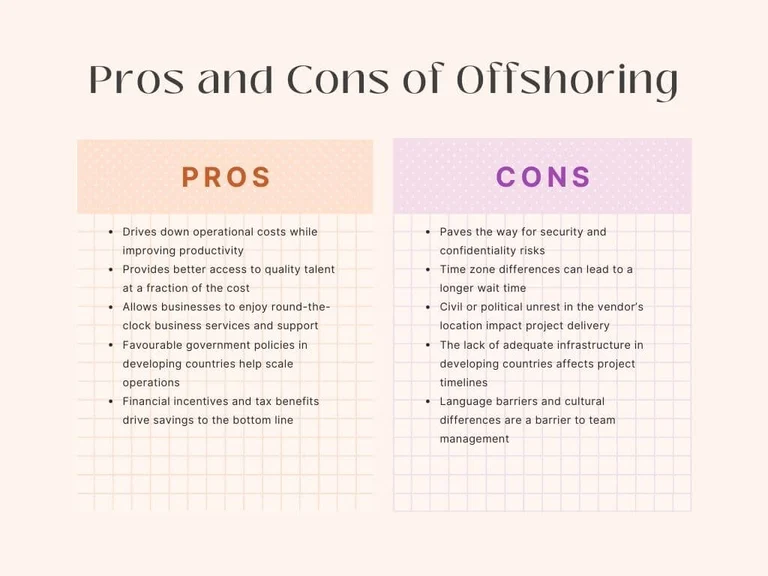Deciding whether to outsource or offshore certain business operations is a complex process with several factors to consider. Both approaches come with potential advantages and disadvantages, and businesses need to carefully weigh aspects such as the nature of the work, the geographical location of service providers, costs, data security, and cultural compatibility. In this blog post, we’ll explore the pros and cons of outsourcing and offshoring, discuss common pitfalls, and share best practices to help you make an informed decision.
What Is Outsourcing?
Outsourcing is delegating a company's business processes to an external provider. Usually, a third-party company or individual is hired to provide services instead of in-house staff. Businesses typically outsource non-core tasks to focus on their core competencies and objectives. Outsourcing is a cost-saving measure, as it can lower operational costs and increase efficiency. However, outsourcing can also have negative consequences, such as creating dependency on the service provider and disrupting the company's internal operations.
Pros and Cons of Outsourcing

What Is Offshoring?
Offshore outsourcing is contracting with a company in another country to provide services or produce goods. This practice has become increasingly popular as businesses look for ways to reduce costs. Offshoring has several benefits, including access to talent and resources, cost savings, and improved efficiency.
There are many reasons why a company might choose offshoring. Perhaps they're looking to save on labour costs or need specialised skills that can’t be found in their own country. Whatever the reason, offshoring can be a great way to get the job done. However, it has its fair share of risks, such as language barriers and cultural differences.
Pros and Cons of Offshoring

Common Outsource vs Offshore Pitfalls
There are several potential pitfalls whenever you outsource or offshore work. Without careful planning and execution, businesses may encounter several challenges that can impact the success of a project. By understanding these risks upfront and taking steps to mitigate them, you can make the right choice between outsourcing and offshoring.
Listed below are some potential risks involved in both options:
Unclear Business Case
When you fail to clearly define business cases while offshoring projects, the ambiguity may lead to communication and implementation errors. Failing to articulate financial outcomes and associated incentives may result in the subjective interpretation of project success, causing friction in vendor relationships.
Miscommunication
Time zone differences and vendor working hour preferences can result in communication difficulties. If the expectations around timing and level of communication are not set early, it can raise apprehension and run the risk of misinformation, leading to delays in project delivery.
Cultural Differences
Despite the many benefits of offshore outsourcing, cultural gaps can cause problems. For example, when offshoring customer service to a vendor in another country, language barriers may make it difficult for customers to communicate with your customer service representatives.
Additionally, the customer service team themselves may have difficulties grasping colloquialisms and local slang. What’s more, there may be differences in cultural norms and values that can lead to different decision-making approaches that impact your existing workflows and quality control.
Security Risks
Both offshoring and outsourcing raise several security concerns. Organizations that offshore IT operations run the risk of data breaches, hacking, and theft of intellectual property. These security risks will only become more prevalent as the world becomes increasingly interconnected.
Best Practices for Outsourcing and Offshoring
When outsourcing or offshoring business processes, it is essential to follow best practices to achieve desired results. Putting together a comprehensive governance framework is critical to the success of any outsourcing or offshoring project. Below are some best practices that can alleviate pain points in outsourcing and offshoring.
- Plan, assess, and document business use cases — even if it adds considerable time to implementation processes. Spelling out expectations decreases the chances of ambiguity and misinterpretations.
- Hash out the timing and level of communication with vendors clearly and specifically. Determine a single point of contact for the vendor, what must be communicated to the vendor, and what circumstances would make it necessary to break communication barriers.
- Provide training on cultural norms and values to both employees and contractors. This helps ensure everyone is on the same page and minimizes cultural miscommunications.
- Ensure that service providers have adequate security protocols to protect their information. Protect your data vigilantly, and ensure that your service providers do the same.
- Develop a solid transition plan that covers everything from knowledge transfer to performance monitoring. Once the knowledge transfer is complete, conduct a readiness assessment to check whether the vendor is ready to take on the project.
Making the Right Choice
Outsourcing and offshoring can be great ways to improve your business’s bottom line, but they are not without risk. By understanding the differences between outsourcing and offshoring, you can make a more informed decision about whether these strategies suit your company.
We hope this article outlines the benefits and risks of outsourcing and offshoring so that you can make the best decision for your business. If you are actively looking to outsource your mobile, web, or software development functions, ask us for free recommendations, and we’d be glad to help you!
.svg)




